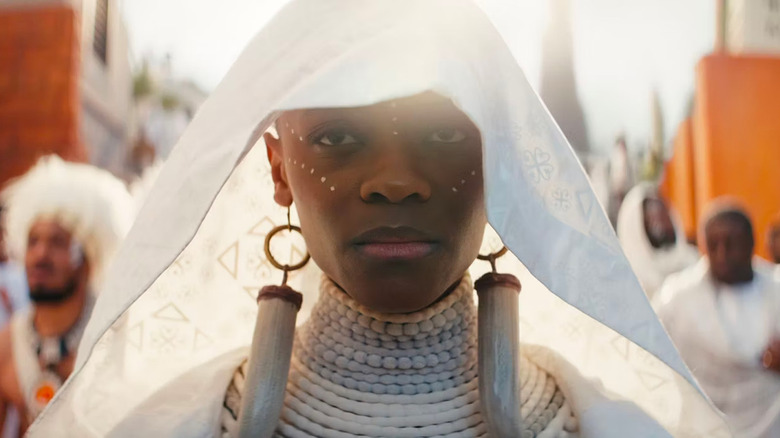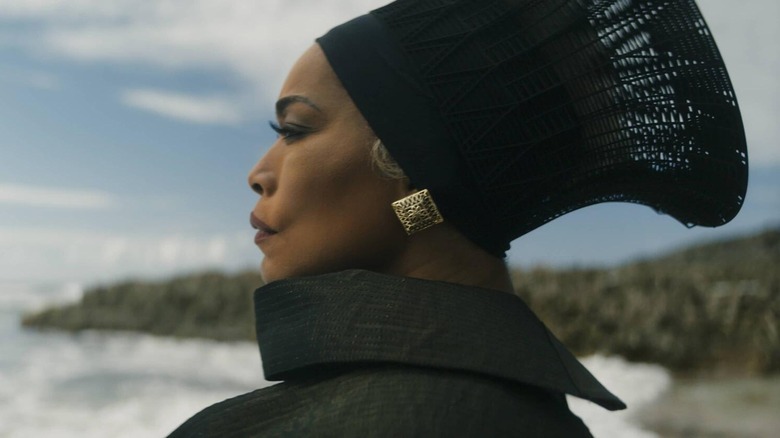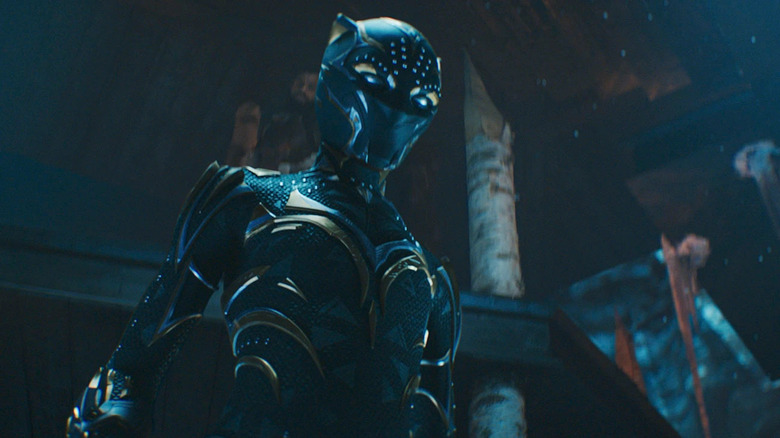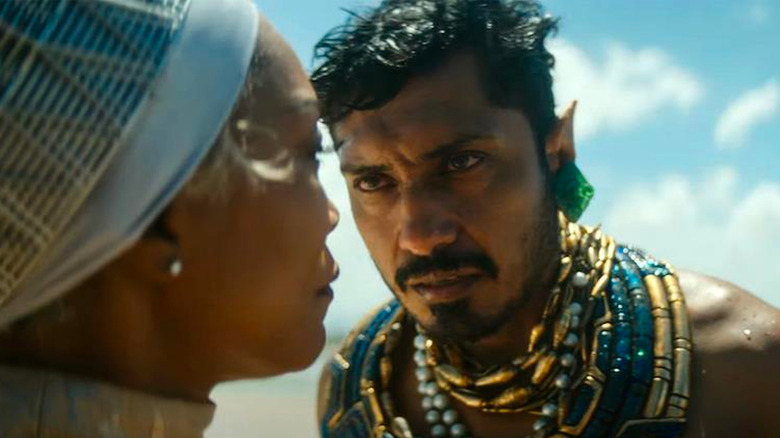Black Panther: Wakanda Forever Review: An Overstuffed, Action-Packed, Emotional Sequel
"Black Panther" wasn't just a box office smash and an Oscar-nominated critical darling. It was a pop culture phenomenon and a reminder that films in the Marvel Cinematic Universe can rise above the standard paint-by-numbers formula ... in the right hands. A sequel to such a big event was always a daunting task, but director Ryan Coogler and company found themselves tasked with the seemingly impossible after "Black Panther" star Chadwick Boseman died from cancer in 2020. Boseman had kept his illness a secret from many, including Coogler, who had already begun working on the script for a "Black Panther" sequel when his star tragically died.
There were several options facing the production in the wake of Boseman's passing. Marvel could scrap the film entirely — although that was not very likely. Coogler and the studio could also recast Boseman's character T'Challa, but that idea was squashed almost immediately, with Marvel Studios head honcho Kevin Feige stating that Boseman's "portrayal of T'Challa the Black Panther is iconic and transcends any iteration of the character in any other medium from Marvel's past," and because of that, the role would not be recast.
And so Coogler moved forward, working with co-writer Joe Robert Cole to create a new story without Boseman's character. It could've all gone horribly wrong, and it's to Coogler's credit that "Black Panther: Wakanda Forever" works as well as it does. Boseman's loss reverberates through nearly every scene, and Coogler isn't afraid to lean into that. This isn't just a big blockbuster sequel, it's a film about how characters move on after losing someone they love. And how they learn to accept that while a person may be physically gone, their presence can remain with you, lingering, not like a ghost, but like a fond memory that burns warm inside your heart. That's not your typical superhero fare, and I could've used more of it — "Wakanda Forever" is still an MCU movie, after all, and there are certain rules it has to follow. But Coogler does his damndest to not let those rules trip up his emotional narrative.
The quest for Vibranium
Rather than delay the inevitable, "Wakanda Forever" opens immediately with the (offscreen) death of T'Challa. The nation of Wakanda is heartbroken and shocked, none more so than T'Challa's sister, the brilliant Princess Shuri (Letitia Wright), who blames herself for not being able to save her brother, and who shrugs off traditions that suggest her dead brother's spirit is still out there, somewhere.
A year after the death, Shuri is still grieving heavily. Her mother, Queen Ramonda (Angela Bassett, who is just wonderful here, making a meal out of every bit of dialogue), tries to help comfort her daughter, but Shuri remains unreceptive. Besides, new problems have surfaced — literally. There's an entire undersea kingdom out there, ruled over by Namor (Tenoch Huerta Mejía), who is kind of like an even more badass version of Aquaman. Alas, Namor's kingdom, Talokan, is never as impressive as the Day-Glo Atlantis seen in James Wan's "Aquaman" movie.
As it turns out, Vibranium, the ancient element and movie MacGuffin that gives Wakanda so much power, has been discovered outside of Wakanda's borders — right smack-dab in the middle of Talokan. This discovery is all due to brilliant college student, Riri Williams (Dominique Thorne), who can build seemingly anything — including her own Iron Man-like suit. Namor, wanting to protect his world from outsiders, resolves to have Riri killed, and he wants the Wakandans to help him. Needless to say, they're not down with the whole "murdering a teenager" idea.
A sense of wonder
This entire setup is rather weak, and it feels like Coogler isn't really interested in it. He'd rather get back to the emotional beats, but he has a superhero sequel to make, and so here we are. As underwhelming as the story may be, "Wakanda Forever" rises above it with several gigantic action set pieces, underscored by pulse-quickening music from Ludwig Göransson, and all of which are better than anything we saw in the first film. Coogler and company have put together huge, clear, thrilling sequences with stellar fights and killer chases. There's a real sense of wonder to these moments as if the filmmaker is channeling the action-adventure atmosphere of "Star Wars" (I'm talking the original "Star Wars" here, back before the entire thing became overexposed and uber-franchised). I particularly liked an early scene where Riri jumps into her robot suit and blasts into the sky, letting out a triumphant "Let's go!" along the way. That's exactly the way a teenager would react to suddenly flying around in a robot suit, and it's little moments like that which give "Wakanda Forever" real life.
Letitia Wright does well with her expanded role here, but "Wakanda Forever" never really feels like her movie. It instead gives plenty of time to the supporting players, most notably Okoye, the resident ass-kicker of Wakanda, played to perfection by Danai Gurira. There's also Winston Duke's always-welcomed M'Baku, who doesn't have a whole lot to do but makes the most of it, and Lupita Nyong'o's Nakia, who gets recruited on a kind of spy mission to help save the day.
Also back: CIA agent Everett K. Ross, who might be the absolute worst character in the MCU. No offense to actor Martin Freeman, someone I usually enjoy, but for crying out loud, can we get rid of this character? He exists solely for exposition, and that exposition could easily come from somewhere else. Every time the film cuts back to Ross and his CIA antics, "Wakanda Forever" grinds to a halt so violently that you can practically see metal-on-metal sparks flying off the screen. I don't care if he was in the first film, I don't care if he's in the comics, I don't care if they're trying to set up a new Disney+ show — this character is an absolute dud, and the sooner everyone realizes that, the better these movies will be.
Grief and acceptance
As for Tenoch Huerta Mejía's Namor, he's perfectly fine. The actor is commanding in the part and manages to make Namor both likable and threatening. However, he lives in the shadow of the first film's villain, Michael B. Jordan's highly-memorable Killmonger. It doesn't help that the character even feels slightly Killmonger-esque in the way that he wants to do something villainous — but we can sort of understand why. There's nothing wrong with a fleshed-out, complicated villain, but the sequel runs the risk of repeating the first film on more than one occasion.
Perhaps sensing that he had no other choice, Coogler packs "Wakanda Forever" to the gills. This is an overstuffed film, where you get the sense that the filmmaker added literally everything he could think of to the story. A go-for-broke approach that's both commendable and kind of exhausting — I definitely started to feel the film's 161-minute runtime, even amidst all the big action scenes.
And underneath it all is a beating heart; a tribute to both Boseman's loss and legacy. The emotional punch is more impactful than the physical one here, and whatever the flaws of "Wakanda Forever," its emotional heft is strong — and honest. There's no sense of manipulation here, only a sense of grief coupled with acceptance. What else can there be?
/Film Rating: 7 out of 10



